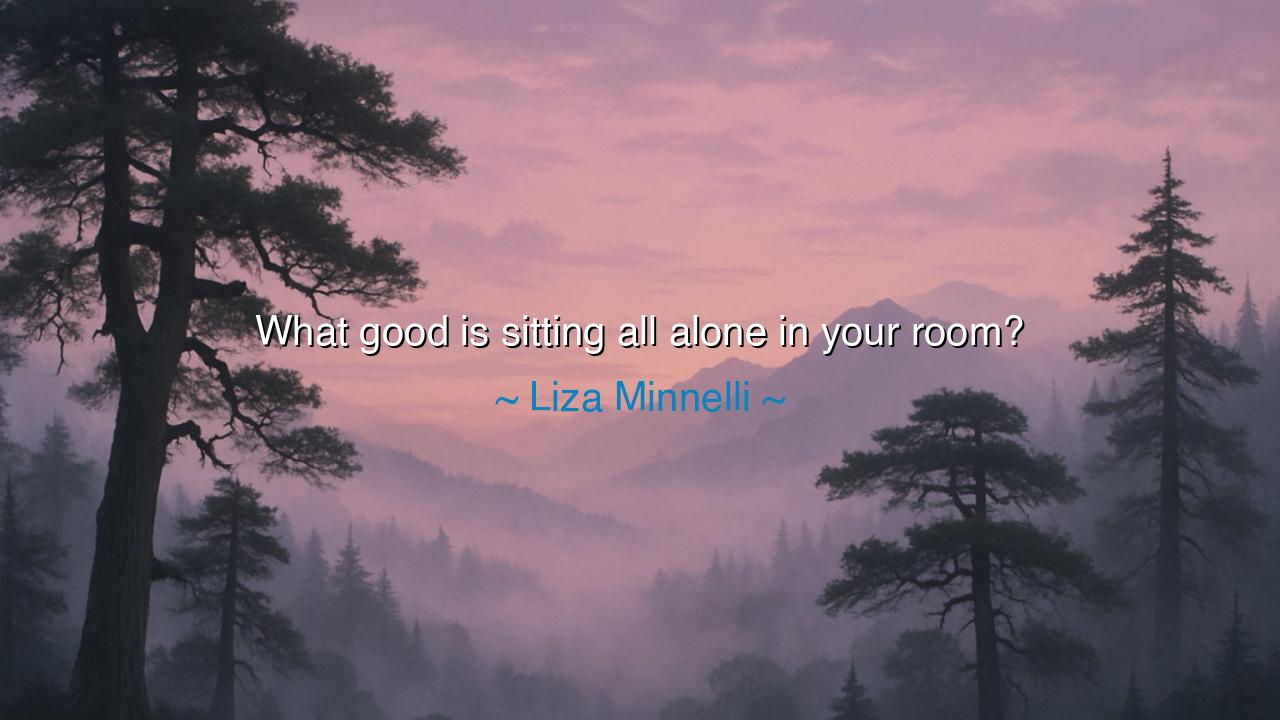
What good is sitting all alone in your room?






The words of Liza Minnelli — “What good is sitting all alone in your room?” — ring out like a trumpet call to the human spirit. Born from the immortal song “Cabaret,” these words are more than the lyrics of a performance — they are a summons to life itself. They speak to every soul that has withdrawn from the world, lost in thought or sorrow, and remind us that life is not meant to be hidden from, but embraced. Minnelli’s voice, fierce and vibrant, carries with it the message of countless generations: that joy, courage, and purpose are not found in isolation, but in the act of living boldly among others.
At its surface, the quote seems almost casual — a light-hearted invitation to rise, to dance, to join the crowd. Yet beneath it lies a profound and timeless truth. The human heart was not made for stillness or retreat. To “sit alone in your room” is to close the window on the great storm of experience, to choose the safety of shadows over the brilliance of the sun. Minnelli’s words, drawn from a song that celebrates vitality and defiance, remind us that the fullness of life lies beyond the threshold of comfort. For no man or woman ever found greatness by remaining seated in solitude; it is only by stepping into the world that one discovers who they truly are.
The origin of the quote can be traced to the musical Cabaret, first performed in the 1960s — a decade of rebellion, renewal, and rediscovery. In the story, the character Sally Bowles, brought to life through Minnelli’s dazzling performance, sings to awaken the spirit of those lost in despair. Her words are a call against apathy, a challenge to those who have grown numb to the beauty and pain of existence. The stage lights flicker, the music swells, and her voice becomes a declaration of war against fear and stagnation. “What good is sitting all alone in your room? Come hear the music play!” It is not merely entertainment — it is philosophy set to melody. It is the cry of the soul refusing to wither in silence.
Throughout history, many have found that to live fully requires stepping beyond the self. Consider Helen Keller, born deaf and blind, who might easily have spent her life “alone in her room,” separated from the world by her own darkness. Yet with courage and guidance, she reached out — learned language, wrote, spoke, and changed lives. Her existence itself became a testament to Minnelli’s message: that isolation is not destiny, and that the will to connect, to act, to participate, transforms even the most limited life into something radiant. Where she could have chosen silence, she instead chose song — a song made of words, struggle, and triumph.
Minnelli’s line also carries a warning for the modern age. In a time when people retreat into screens and solitude, her words are more vital than ever. To “sit all alone in your room” may now mean scrolling endlessly, waiting for life to happen through glass and pixels. Yet, as in every age, the world outside still calls — the laughter of friends, the rhythm of the streets, the hum of creation itself. To live behind closed doors is to miss the heartbeat of existence. The quote thus becomes a sacred reminder that life’s beauty cannot be observed from afar; it must be entered into, with all its chaos, passion, and imperfection.
But this is not merely a call to pleasure or distraction. Beneath its lively tone lies something more profound — a call to engagement with life’s purpose. When Minnelli asks, “What good is sitting all alone?” she is also asking: What good is potential unrealized? What good is love unexpressed? What good is a heart that beats only for itself? The world, she reminds us, awaits participation. Art, friendship, service, and joy — all these are acts of communion, impossible in isolation. To hide from life is to deny the gift of being alive at all.
The lesson, then, is clear and radiant: live outwardly. Do not let fear or doubt keep you behind the walls of your own making. The stage of the world awaits your presence, and the music of life plays on — with or without you. Step into it. Speak, act, dance, love. Make mistakes, laugh loudly, fail grandly, rise again. For as Minnelli’s lyric proclaims, to sit alone is to let the song of existence pass you by — and that is the greatest tragedy of all.
So, O listener, when you find yourself withdrawn from life’s great current, remember these words: “What good is sitting all alone in your room?” Rise, and open the door. Step out into the world, however uncertain it may be. The music is playing — the music of laughter, of love, of shared humanity. And it calls to you, as it called to every soul before you: come, and live.






AAdministratorAdministrator
Welcome, honored guests. Please leave a comment, we will respond soon